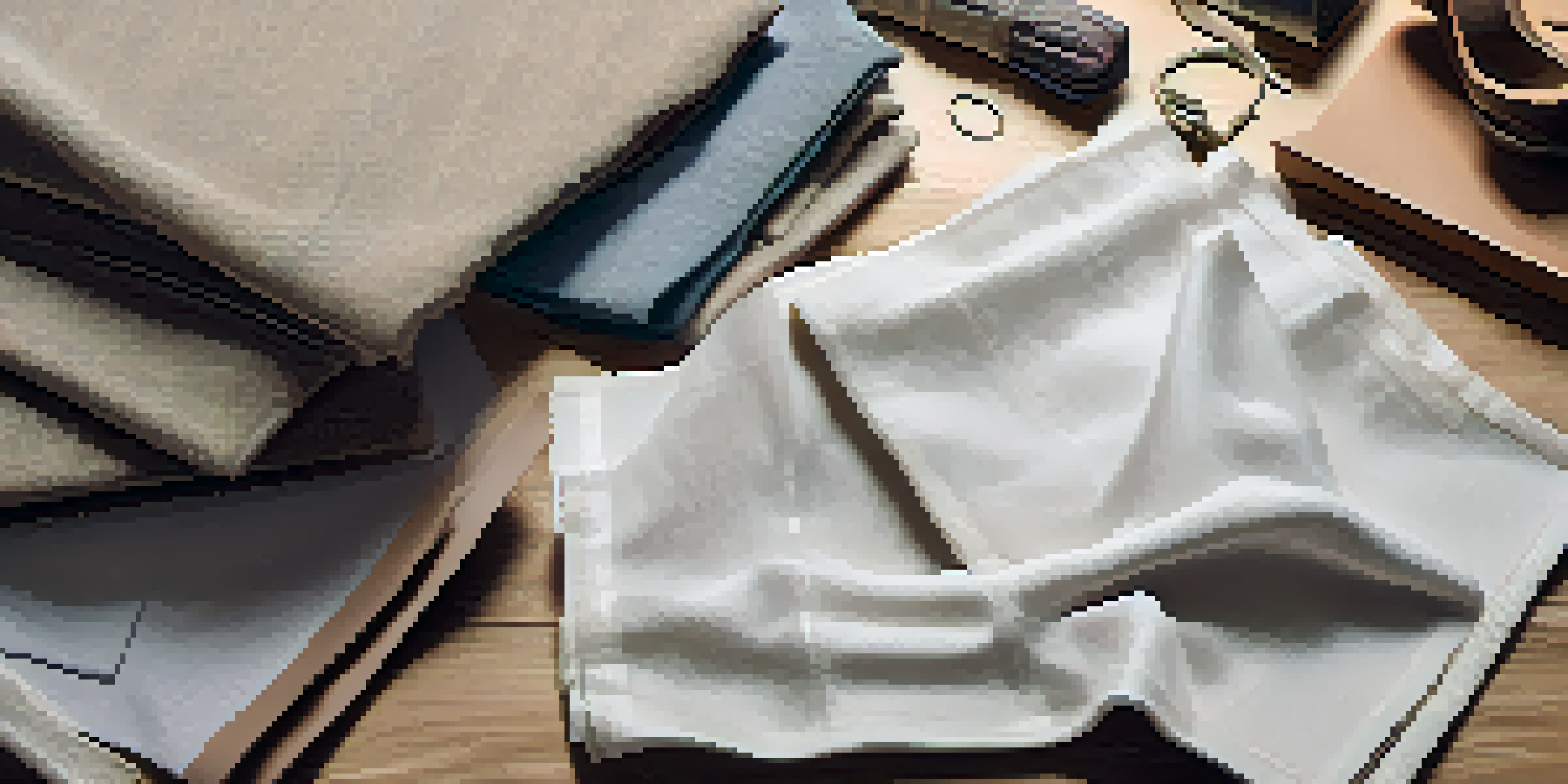Sustainable Sourcing: Luxury Brands and Ethical Materials

The Rise of Sustainability in Luxury Fashion
In recent years, sustainability has become a buzzword in the luxury fashion industry. As consumers become more environmentally conscious, luxury brands are increasingly adopting sustainable practices. This shift isn't just about being trendy; it reflects a growing awareness of the environmental impacts of fashion.
Sustainability is no longer a trend; it's a new way of thinking in luxury fashion.
Luxury brands are now prioritizing sustainable sourcing, which means they are seeking materials that are ethically produced and environmentally friendly. For example, brands like Stella McCartney have led the way by using innovative materials like organic cotton and recycled polyester. This approach not only reduces waste but also resonates with consumers who value ethical practices.
As this trend continues, luxury brands are finding that sustainability can enhance their appeal. It’s not merely about high price tags anymore; consumers want to know where their products come from and how they are made. This shift is creating a new era in luxury fashion, one where ethics and style go hand in hand.
Understanding Ethical Materials in Fashion
Ethical materials are those that are sourced responsibly, ensuring fair labor practices and minimal environmental impact. This can include organic cotton, Tencel, and even vegan leather made from recycled materials. Understanding these options is crucial for brands aiming to create a more sustainable future.

For instance, organic cotton is grown without harmful pesticides and fertilizers, making it a better choice for the environment and the farmers who cultivate it. Similarly, Tencel, made from sustainably sourced wood pulp, offers a biodegradable alternative to traditional fabrics. These materials not only reduce the carbon footprint but also promote a healthier ecosystem.
Sustainability Drives Luxury Fashion
Luxury brands are increasingly adopting sustainable practices to meet the growing consumer demand for ethical and environmentally friendly products.
Moreover, luxury brands are increasingly transparent about their sourcing practices. By showcasing their commitment to ethical materials, they are building trust with consumers. This transparency is essential in today’s market, where customers are more informed and discerning about their choices.
Case Studies: Luxury Brands Leading the Way
Several luxury brands have taken significant strides in sustainable sourcing, setting inspiring examples for others. For example, Gucci has launched its 'Gucci Off The Grid' collection, featuring products made from recycled, organic, and sustainably sourced materials. This initiative not only highlights their commitment to sustainability but also appeals to eco-conscious consumers.
The future of fashion lies in sustainability and ethical practices, where luxury meets responsibility.
Another noteworthy example is the fashion house of Burberry, which has pledged to become carbon neutral by 2022. Their use of renewable energy and sustainable materials in their collections showcases how luxury can coexist with environmental responsibility. These brands are proving that luxury doesn’t have to come at the expense of the planet.
These case studies serve as a reminder that luxury brands can lead the charge in sustainable practices. By adopting innovative approaches and responsible sourcing, they can not only enhance their brand image but also contribute positively to the environment.
The Role of Certifications in Sustainable Sourcing
Certifications play a crucial role in ensuring that materials used in luxury fashion are ethically sourced. Labels like Global Organic Textile Standard (GOTS) and Fair Trade signify that products meet specific environmental and social criteria. These certifications help consumers make informed choices.
For instance, a GOTS certification guarantees that organic fibers are sourced and processed according to strict environmental and social standards. This not only provides assurance to consumers but also encourages brands to maintain high levels of sustainability. As consumers become more aware, these certifications will likely influence their purchasing decisions.
Ethical Materials Build Trust
The use of responsibly sourced materials, backed by certifications, enhances brand credibility and fosters consumer trust in the luxury market.
Therefore, luxury brands that prioritize certified materials can enhance their credibility. By committing to recognized standards, they not only contribute to sustainable practices but also build trust with a growing audience that values ethical consumption.
Consumer Demand for Sustainable Luxury
Consumer demand for sustainable luxury is on the rise, driving brands to rethink their sourcing strategies. A growing number of shoppers are willing to pay more for products that are ethically sourced and environmentally friendly. This shift is reshaping the luxury market, pushing brands to adapt to these changing consumer preferences.
Surveys indicate that millennials and Gen Z consumers, in particular, prioritize sustainability when making purchasing decisions. They are not just looking for high-quality items; they also want to support brands that align with their values. This trend is prompting luxury brands to innovate and incorporate sustainable practices into their core business strategies.
Ultimately, this demand for sustainable luxury reflects a broader societal shift towards responsible consumption. As brands respond to this trend, they are not only meeting consumer expectations but also playing a crucial role in promoting a more sustainable future for the fashion industry.
Challenges in Implementing Sustainable Sourcing
While the shift towards sustainable sourcing is encouraging, it’s not without its challenges. Many luxury brands face obstacles such as higher costs of sustainable materials and the complexities of supply chain management. Transitioning to ethical sourcing requires time, investment, and a commitment to change.
Moreover, the luxury fashion industry often contends with a reputation for excessive waste and unsustainable practices. Overcoming this perception can be difficult, as brands must demonstrate genuine efforts in sustainability rather than simply engaging in 'greenwashing.' This highlights the importance of transparency and accountability in their practices.
Challenges in Sustainable Sourcing
While the shift to sustainable sourcing is promising, luxury brands face challenges such as higher costs and the need for transparency to avoid greenwashing.
Despite these challenges, many brands are finding innovative solutions to navigate the sustainable sourcing landscape. By collaborating with suppliers and investing in new technologies, they can create a more ethical supply chain while still maintaining their luxury status.
The Future of Sustainable Sourcing in Luxury Fashion
The future of sustainable sourcing in luxury fashion looks promising as more brands embrace ethical practices. As sustainability continues to gain traction, we can expect to see an increasing number of brands committing to responsible sourcing. This shift not only benefits the environment but also enhances brand loyalty among conscious consumers.
Looking ahead, technology will play a pivotal role in facilitating sustainable sourcing. Innovations such as blockchain can enhance traceability in supply chains, ensuring that materials are sourced ethically. This level of transparency will empower consumers to make informed choices and further drive demand for sustainable luxury.

As the industry evolves, luxury brands that prioritize sustainability will likely lead the way in shaping consumer expectations. By embracing sustainable sourcing, they can create a positive impact while remaining relevant in a rapidly changing market, ensuring a brighter future for both the fashion industry and the planet.